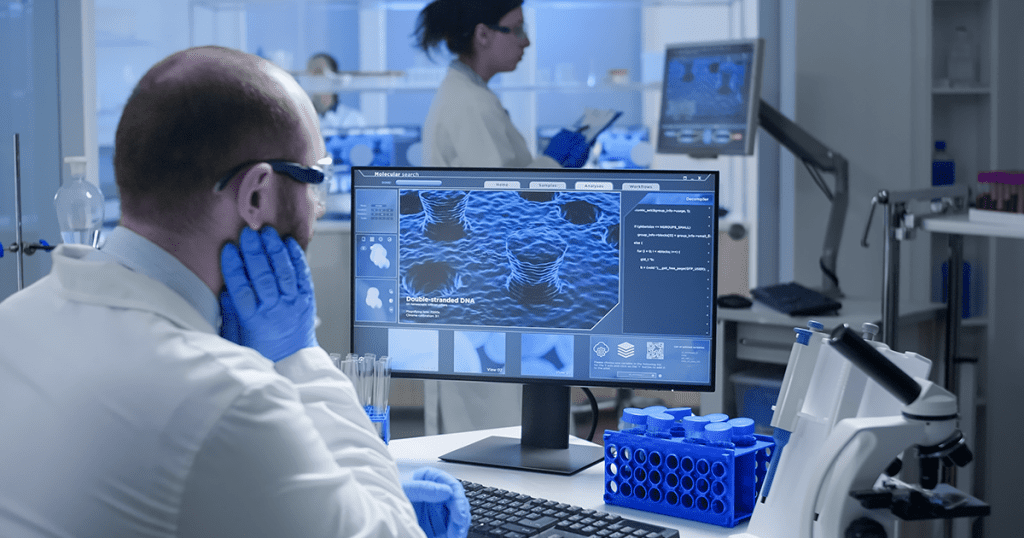Artificial intelligence (AI) is a powerful tool for healthcare professionals, and one of its core applications in this industry is medical imaging. With the ability to analyze large amounts of data quickly and accurately, AI is helping to improve disease detection and diagnosis and personalize treatment plans. Are you interested in learning more?
Read this article to discover the exciting applications and examples of using AI in medical imaging.
The Growing Role of AI in Medical Imaging: Trends and Predictions
According to Mordor Intelligence’s report, the AI Market for Medical Imaging is expected to witness a substantial growth rate of 30.4% from 2022 to 2027. The authors of the report say that this growth can be attributed to the increasing aging population and the growing investments in healthcare infrastructure.
Developed countries are investing heavily in providing advanced and affordable healthcare services to their citizens, positively impacting the overall market growth. The growth of AI in medical imaging is expected to revolutionize disease detection, diagnosis, and personalized treatment plans, leading to a more efficient and effective healthcare system.
AI in medical imaging: where is it useful?
1. Detecting breast cancer
Breast cancer is the second most common cancer among women. But conventional mammogram screenings miss 1-in-5 cases. According to a paper published in The American Journal of Surgical Pathology, Google’s AI powered Lymph Node Assistant (LYNA) detects breast cancer metastasis with 99% accuracy.
2. Prescribing targetted treatments
According to research, two experienced pathologists will only agree on a course of treatment about 60 percent of the time, even when assessing the same data. Using AI in medical imaging removes subjectivity with a quantitative approach, helping identify the type of cancer and determine how to treat it. With this advancement in precision medicine, physicians can provide more personalized treatment plans that target the specific illness.
3. Predicting the risk of a heart attack
AI in medical imaging isn’t only helpful in identifying existing conditions. It can detect the risk of developing a future illness. One recent study shows how combining AI imaging with clinical data is helping physicians improve predictive models that indicate whether a patient is at a high risk of having a heart attack.
4. Spotting neurological decline
MRI scans aid the diagnosis of neurological conditions like Alzheimer’s and multiple sclerosis by helping doctors spot signs of disease, including lesions, growth, and shrinkage. However, slight changes in the brain are easy for the human eye to miss. On the other hand, artificial intelligence can quantify changes in a patient’s brain, allowing the early detection and diagnosis of neurological disease.
5. Improving the outcome of surgery
AI in medical imaging can even enable surgeons to improve surgical outcomes. It does this by helping healthcare professionals better plan procedures before the actual operation, reducing surgery time and leading to better results.
5 Key Advantages of Using AI in Medical Imaging
- Improved accuracy: AI algorithms can analyze medical images with greater accuracy than humans, reducing the chances of misdiagnosis or missed diagnoses. This helps to improve patient outcomes and reduce healthcare costs.
- Personalized treatment plans: AI can help physicians create personalized treatment plans for patients by analyzing medical images and other clinical data. This can lead to more effective treatments and better outcomes for patients.
- Faster diagnosis: AI algorithms can analyze large amounts of medical imaging data quickly, leading to faster and more accurate diagnoses. This can help healthcare professionals make informed decisions about patient care in a timely manner.
- Reduced healthcare costs: By improving the accuracy of diagnoses and treatments, AI can help reduce healthcare costs. This is especially important in the current healthcare landscape, where costs are rising, and resources are limited.
- Improved workflow: AI can automate many routine tasks in medical imaging, such as image analysis and report generation. This can help healthcare professionals work more efficiently, freeing up time to focus on patient care.
Implement AI in your healthcare company
Artificial intelligence has a wide variety of applications in medicine.
And as you can see, it’s advancing healthcare in several ways. But if you want to learn more about the healthcare industry’s challenges, as well as how AI is actively solving them, watch our webinar on how healthcare companies can create new business models using AI.
Or, if you’d like help with medical image processing, feel free to contact us directly. Our team has its roots in healthcare, and we’d be delighted to share our experience with you.





